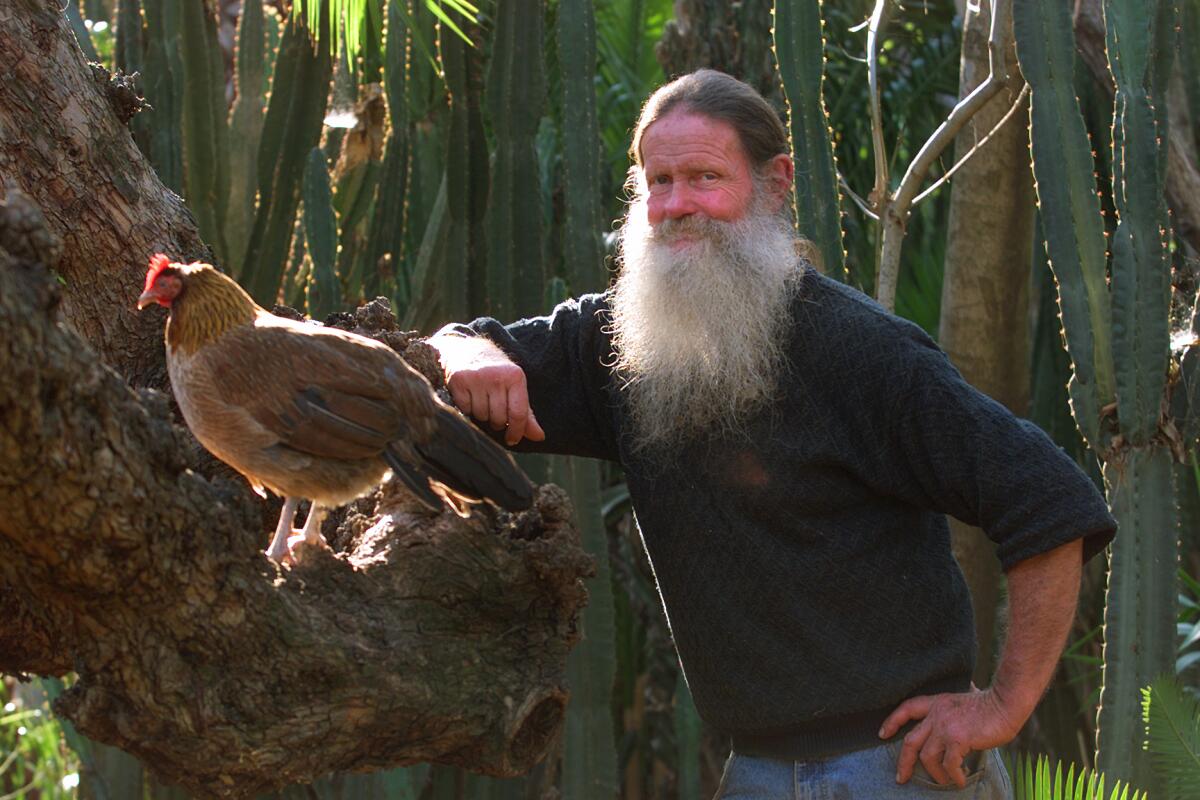Tim Dundon, ‘Guru of Doo Doo,’ whose compost nourished Altadena’s gardens, dies at 77

- Share via
Timothy “Tim” Dundon had been working as a plasterer and iron worker in 1973 when a Beatles-induced vision struck him.
It involved “Act Naturally,” a Beatles cover about a sad and lonely man who dreams of being an Oscar-winning movie star. By 1985, when a Times reporter asked him about it, Dundon’s vision had grown fuzzy, but it had seeped so deep into his psyche that it altered his life’s purpose.
From there on, Dundon dedicated his life to legalizing marijuana and nourishing the mountain of fertilizer he kept in his Altadena backyard. His eureka moment, he told The Times in 2001, “showed me this was something that would change the world and make it into a better, more peaceful place.”
Dundon, a rhyming whiz known widely by his alter ego “Zeke the Sheik” and whose legendary, mountainous compost pile delighted some and troubled others — and who famously defended himself in court in rhyme — died Monday in West Hills, said his friend Ilham Akraa. He was 77.
The self-proclaimed “Guru of Doo Doo” peacefully tended to his 40-foot-high and nearly 200-foot-wide compost heap for 35 years. His concoction of animal poop, household garbage and mulch from a neighboring cemetery nourished his lush one-acre jungle and fertilized many of San Gabriel Valley’s organic gardens. He also provided the compost free to the Altadena Community Garden for more than 15 years.
“The pile is my baby,” Dundon told the Pasadena-Star News in 2005. “This is the tower of power, that makes people behind Katie Couric and Matt Lauer, quiver and cower, ‘cause it generates the power that makes a flower.”
It was a memorial to the message he was hoping to spread: that waste could be converted into something that regenerates, not devastates, life on Earth.
But Dundon’s compost mound spontaneously combusted in February 1990, sending flames and smoke into the air. The Los Angeles County Department of Health, deeming the heap a health hazard and an illegal dump, ordered him to tear it down.
Dundon cut down its size by shoveling silt over the pile, and by October, the heap’s core was ashes, the fire out.
He saved his tower of dung.
Years later, after many efforts by supporters to stop the county from demolishing Dundon’s work, the bureaucrats succeeded. His compost mass, which stood on a property adjacent to Dundon’s home that was owned by Mountain View Cemetery, was bulldozed on April 20, 2005.
He was devastated. For Dundon, his compost was a symbol of life. Of rebirth and happiness.
Neighbors and community members, devoted fans of the pile, felt the same pain as they had years before when the county hauled away part of the heap.
“They’re raping a local landmark,” Jim Norman, a tree service owner told The Times in 2001. “He is just trying to promote the planet. Tim’s compost is the best around. Everyone in the community believes his place is an asset.”
Dundon got into trouble with the county again in 2012 for the chickens, ducks, turkeys and geese that wandered onto the street, and for the lush overgrowth on his property, which once served to hide the marijuana plants he was growing.
One of three children of Edna, a classically trained violinist, and Frank, an aerospace executive, Dundon was born June 5, 1942, in Los Angeles. He dropped out of high school and was twice divorced. He had two children.
He was an experimental, eccentric and playful man who once cared for two pet coyotes and told stories of driving to Mexico in the 1960s for amphetamines, said his friend Charles E. Dinkel.
Dundon’s involvement with drugs, particularly marijuana, caused him several run-ins with the law.
The most legendary case was in 1985, when Dundon faced charges for cultivating, possessing and selling marijuana. Donning a blue headdress and a floor-length caftan in Pasadena Superior Court, Zeke the Sheik defended himself in rhyme for 20 minutes. The judge, court reporter and Los Angeles County sheriff’s deputies were left in stitches.
“I’m the politician for which you all have been wishing, ever since I had the vision that my mission, was to end the great second Prohibition and to form the coalition, for the abolition of nuclear fission and, in addition, to wipe out malnutrition,” Dundon said in court. “Because this all put me under a great deal of suspicion, I made the decision to make the transition to become a politician.”
Still, he was convicted. But rather than serving six years in prison, he served 18 days in jail.
“He was a man who was way ahead of his time in terms of the legality of marijuana,” said Ray Fountain, Dundon’s attorney in the case.
“The amazing thing about Tim Dundon,” he said, “is how he could talk in rhyme as though he was reading from a book. He was able to talk and rhyme in the most extraordinary way. ... It was some kind of gift.”
But playful as Dundon was, his friend Dinkel saw his desperation.
“There was also an urgency to him wanting to share his discoveries about nature and how we can regenerate the planet,” Dinkel said. With his compost and fertile soil, Dundon “inoculated this whole region with his mojo. ... He was a pioneer of public and community composting. ... He was ahead of his time in the environmental movement.”
In his later years, Dundon’s body became horseshoe shaped. He curved toward the soil and could barely walk. But friends still found him among the greenery, clippers in hand, telling his plants, “I love you.”
More to Read
Start your day right
Sign up for Essential California for the L.A. Times biggest news, features and recommendations in your inbox six days a week.
You may occasionally receive promotional content from the Los Angeles Times.







